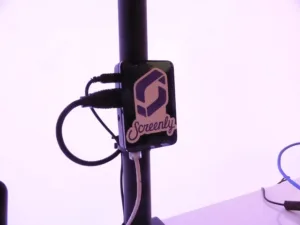Canonical was promoting Ubuntu Core (launched late-2014): a version of the OS for IoT devices. Advantages include reliability (failed updates will automatically revert back to the original version) and security (apps cannot interact with each other to, i.e. use a camera). Core can be run on multiple platforms, and a new partner, Screenly, was using it on a Raspberry Pi to build a web-enabled content management system and video player.
Screenly had been using Raspian: an OS based on Debian, for the Pi. However, the company found it too limited, and switched to Ubuntu instead. The system is able to play 1920 x 1080 video, render web content and manage content. We were told that up to 1,000 screens can be managed from a single web-based UI.
Currently Screenly is building its base, and is running on around 10,000 screens – of all types, not only digital signage. These are mostly located in the Nordics. Scale is the next step.
Customers can currently benefit from a limited-time offer: sign up to Screenly for one year and receive the hardware (worth around $35) for free.

